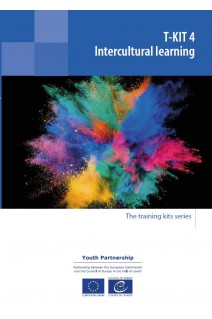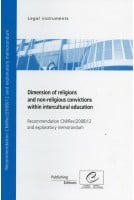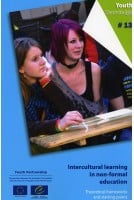



Intercultural learning is an important topic for the priorities of both the European Commission and the Council of Europe, and of their partnership in the field of youth.
Intercultural learning is an educational approach that can lead to social transformation, so that people from different cultural backgrounds can develop positive relations based on the values and principles of human rights and on seeing cultural differences as positive things. It is a form of political and social education that needs to pay attention not only to intercultural relations, but also to different understandings of culture and diversity, power relations, distribution of resources, political and social context, human rights, discrimination, history and daily interactions among different groups.
This T-Kit was developed for the context of youth work and non-formal education with young people, both of which support the personal development, social integration and active citizenship of young people. Educators and youth workers have an important role in addressing intercultural learning in their work with young people. They can stimulate young people’s learning in their daily lives, so that they can question and extend their perception, develop competences to interact positively with people from different cultural backgrounds and embrace the values of diversity, equality and dignity. In today’s Europe, these values and skills are fundamental for young people and for society as a whole in order to continue building peace and mutual understanding.
INTRODUCTION
What is in the T-Kit? Structure and content
1. INTERCULTURAL LEARNING: INTERSECTIONS AND LIMITATIONS
Related concepts and institutional approaches
Intercultural learning and current realities
2. INTERCULTURAL LEARNING: THEORIES, CONTEXTS, REALITIES
Culture, identity and social realities
Narratives on diversity from different sources
What is intercultural learning really about?
Stereotypes, prejudices and discrimination
Models and theories of intercultural learning
3. FACILITATION AND DESIGN OF INTERCULTURAL LEARNING PROCESSES
Intercultural learning – General considerations
Key aspects for meaningful intercultural learning processes
Competences developed through intercultural learning
Facilitators’ role in intercultural learning processes
Designing and running relevant sessions for different target groups
4. EDUCATIONAL ACTIVITIES
Building an educational programme
Key to the presentation of the activities
Educational activities
5. INTERCULTURAL LEARNING IN ACTION
Intercultural learning and active citizenship
Intercultural learning and human rights activism
Intercultural learning and youth work
Intercultural learning and voluntary work
Intercultural learning and organising educational activities
Intercultural learning and raising awareness
The Living Library
Intercultural learning and campaigning
Intercultural learning and the power of images
Intercultural learning and the media
Intercultural learning and social media
Intercultural learning and formal education
Intercultural learning and cultural mediation
Intercultural learning and conflict transformation
BIBLIOGRAPHY
ABOUT THE AUTHORS













Intercultural learning is an important topic for the priorities of both the European Commission and the Council of Europe, and of their partnership in the field of youth.
Intercultural learning is an educational approach that can lead to social transformation, so that people from different cultural backgrounds can develop positive relations based on the values and principles of human rights and on seeing cultural differences as positive things. It is a form of political and social education that needs to pay attention not only to intercultural relations, but also to different understandings of culture and diversity, power relations, distribution of resources, political and social context, human rights, discrimination, history and daily interactions among different groups.
This T-Kit was developed for the context of youth work and non-formal education with young people, both of which support the personal development, social integration and active citizenship of young people. Educators and youth workers have an important role in addressing intercultural learning in their work with young people. They can stimulate young people’s learning in their daily lives, so that they can question and extend their perception, develop competences to interact positively with people from different cultural backgrounds and embrace the values of diversity, equality and dignity. In today’s Europe, these values and skills are fundamental for young people and for society as a whole in order to continue building peace and mutual understanding.
Please note that in accordance with our terms & conditions, PDF/epubs may only be purchased by private individuals.
